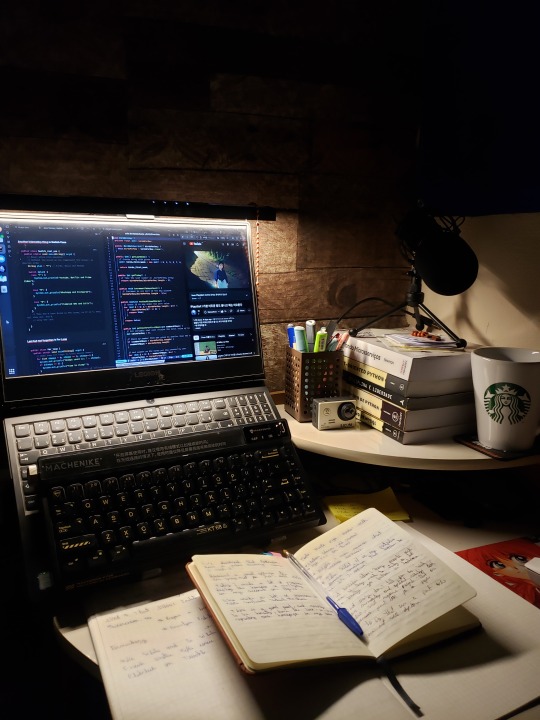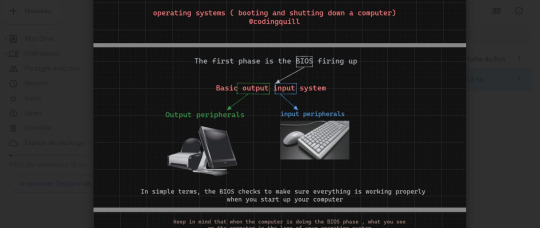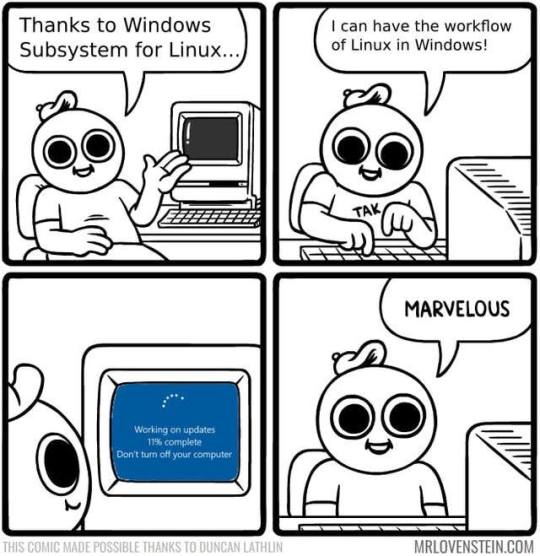#Linux Programming
Text

"Memory leak"
#art#digital art#illustration#fyp#fypシ#fypツ#my art#artists on tumblr#programming#pixel art#anime#black and white#glitch#glitch art#linux#bash#unix#computer science#unixporn#algorhythm#zaraz7
2K notes
·
View notes
Text

2K notes
·
View notes
Text
me_irl

204 notes
·
View notes
Text
As someone who is not technically savvy and who uses Linux because fuck Windows, I have a hot take that some programmers might not like: under no circumstances should the end-user of a program have to interact with the eldritch monstrosity that is github!
It's overwhelming, makes no sense, and absolutely should not be necessary for me to use your thing.
221 notes
·
View notes
Text


Getting old is interesting. I've always been a middle ground between sports (skateboarding, surfing, jiu-jitsu) and an avid student. Over time, it's clear that you can't keep trying the same tricks, just as you can't study the same way.
Today, as I'm writing an article about event-driven architectures, I realize that final exams in college were much easier, just like it's not as easy to jump the same stairs on a skateboard as I did when I was 18.
In the image, you can see my favorite note-taking app, Obsidian, and my Neovim terminal. I'm diving deep into Java, and for that, I'm taking a Spring Boot bootcamp offered by Claro through the DIO Innovation One platform.
#coding#linux#developer#programming#programmer#software#software development#student#study aesthetic#study blog#studyblr#studying#studentlife#studentlearning#masterdegree#master degree#softwareengineering#softwareengineer#study motivation#studyblr community#brazil#java#javaprogramming#apachekafka#self improvement#self study#study inspiration#room#room decor#dark academia
132 notes
·
View notes
Text
this may be an unpopular opinion but software should be a lot, a looooooooooooooot more sustainable than it is right now, the drive for profit forces consumers to throw away old devices for new ones, this is so horribly wasteful it's offensive
have you tried it a custom windows version before? a windows pc that needs at least 25 gb could be in just plain 8gb, you need 8gb of ram at least? a custom made windows could run under 1.5gb or so.
this is a world of difference for people from low income countries who have low end devices, its the difference from barely running software to a fully working machine
Remember jailbreak and rooting? the phone modding community is still going, there are multiple projects to run a customized version of android, people are even trying to put linux on it, there are even indie phone manufacturers now!!!!!!!!!!, you could buy right now a phone that is not from a big company, but why all of this? to get away from android/samsung/apple as much as possible and reclaim hardware as our own.
a lot of devices that reached end of commercial life is still going thanks to efforts like these.
If possible, please learn phone modding and get a bit tech savvy with custom os, maybe even give linux a try, learn how to install f droid and install super lightweight and privacy respecting apps, use firefox or similar to get an adblocker, the world of tech can be way way less resource and money intensive than you think
#solarpunk#sustainability#tech#linux#phone modding#custom os#web bloat#tech bloat#tech debt#programming
172 notes
·
View notes
Note
hellooo very cool person I am just now getting into the atla fandom and I know Nothing other than your fics are very cool and great and I was wondering if you have any recs (or links to posts with recs!!) bc I trust your judgment LOL
I hope this is ok to ask!! also I will add that I am not that picky but I will add that I am very much a longfic enjoyer so🫶🫶
My friend, may I open up to you the broad world of clicking an AO3 user's bookmarks. <3
AKA: literally click any ao3 username, "bookmarks" should appear towards the top of the resulting page. You can then voyage into the additionally wonderful waters of filtering by length, "recommended", fandom, etc.
Also: if the fic you like is in collections, try checking them out, especially if the title appeals to you. Can be a great way to find essentially a fic playlist.
Anyway all hail ao3's designers they done good work
#Oh for an internet designed purely by people for people#Not by people who want money for people who are about to have less money#AO3 you are a light onto my days#In other but thematically related news I'm researching the switch to Linux#Because new laptop came with Windows 11 and if I need to learn command line edits to get this functional#(read: not actively hostile)#I might as well finally make the switch to the computer system not designed to maximize my suffering#Reading their list of recommended programs was hilarious because I literally use all of them instead of the Windows ones already#Go go free and open programs go#ao3
114 notes
·
View notes
Text
Just installed Linux
#transition goals
#transfem#trans pride#trans rights#trans#transgender#transsexual#mtf trans#trans fem#trans feminine#trans femme#trans girl#linux#linuxposting#programming#coding#girls in stem
153 notes
·
View notes
Text

747 notes
·
View notes
Text

Xenia and Chujin are K&R friends
166 notes
·
View notes
Text
What happens when you start your computer ? ( Booting a computer )
We studied this in the lecture today, and it was quite interesting. What makes something a hundred times simpler than it is? Creating a story about it. That's why I made this super fun dialog that will help you understand it all.
I've set up a drive to compile everything I create related to the Linux operating system. Feel free to explore it for more details on the topics discussed in the conversation below. Check it out here.

Have a fun read, my dear coders!
In the digital expanse of the computer, Pixel, the inquisitive parasite, is on a microventure with Binary, a wise digital guide. Together, they delve into the electronic wonders, uncovering the secrets hidden in the machine's core.
Pixel: (zooming around) Hey there! Pixel here, on a mission to demystify the tech wonders . There's a creature named Binary who knows all the ins and outs. Let's find them!
Binary: (appearing with a flicker of pixels) Pixel, greetings! Ready to explore what happens inside here?
Pixel: Absolutely! I want the full scoop. How does this thing come alive when the human outside clicks on "start"?
Binary: (with a digital chuckle) Ah, the magic of user interaction. Follow me, and I'll reveal the secrets.
(They traverse through the circuits, arriving at a glowing portal.)
Pixel: (inquiring) What's the deal with this glowing door?
Binary: (hovering) Pixel, behold the BIOS - our machine's awakening. When the human clicks "start," the BIOS kicks in, checking if our components are ready for action.
(They proceed to observe a tiny program in action.)
Pixel: (curious) Look at that little messenger running around. What's it up to?
Binary: (explaining) That, Pixel, is the bootloader. It plays courier between the BIOS and the operating system, bringing it to life.
Pixel: (excitedly buzzing) Okay! How does the computer know where to find the operating system?
Binary: Ah, Pixel, that's a tale that takes us deep into the heart of the hard disk. Follow me.
(They weave through the digital pathways, arriving at the hard disk.)
Pixel: (curious) Huh? Tell me everything!
Binary: Within this hard disk lies the treasure chest of the operating system. Let's start with the Master Boot Record (MBR).
(They approach the MBR, Binary pointing to its intricate code.)
Binary: The MBR is like the keeper of the keys. It holds crucial information about our partitions and how to find the operating system.
Pixel: (wide-eyed) What's inside?
Binary: (pointing) Take a look. This is the primary boot loader, the first spark that ignites the OS journey.
(They travel into the MBR, where lines of code reveal the primary boot loader.)
Pixel: (in awe) This tiny thing sets the whole show in motion?
Binary: (explaining) Indeed. It knows how to find the kernel of the operating system, which is the core of its existence.
(They proceed to the first partition, where the Linux kernel resides.)
Pixel: (peering into the files) This is where the OS lives, right?
Binary: (nodding) Correct, Pixel. Here lies the Linux kernel. Notice those configuration files? They're like the OS's guidebook, all written in text.
(They venture to another partition, finding it empty.)
Pixel: (confused) What's the story with this empty space?
Binary: (smirking) Sometimes, Pixel, there are barren lands on the hard disk, waiting for a purpose. It's a canvas yet to be painted.
Pixel: (reflecting) Wow! It's like a whole universe in here. I had no idea the operating system had its roots in the hard disk.
(They continue their microventure, navigating the binary landscapes of the computer's inner world.Pixel gazes at the screen where choices appear.)
Pixel: What's happening here?
Binary: (revealing) This is where the user picks the operating system. The computer patiently waits for a decision. If none comes, it follows the default path.
(They delve deeper into the digital code, where applications start blooming.)
Pixel: (amazed) It's like a digital garden of applications! What's the enchantment behind this?
Binary: (sharing) Here, Pixel, is where the applications sprout to life. The operating system nurtures them, and they blossom into the programs you see on the screen.
Pixel: (excited) But how does the machine know when the human clicks "start"?
Binary: It's the BIOS that senses this initiation. When the human triggers "start," the BIOS awakens, and we embark on this mesmerizing journey.
#linux#arch linux#ubuntu#debian#code#codeblr#css#html#javascript#java development company#python#studyblr#progblr#programming#comp sci#web design#web developers#web development#website design#tech#html css#operatingsystem#windows 11
362 notes
·
View notes
Text
I recently turned back to linux after getting a PC running win11 because everything was too infuriatingly stable and there were never any problems to fix
Oh noo, discord support for linux doesn't exist and extremely simple features such as having audio while screensharing aren't available? Welp. Time to jump ship, and use another client
"Bluh bluh you're breaking TOS"
Yeah motherfucker go fix support for my not-windows OS and get back to me
Always funny to me how developers want you to use their official program, but won't ever pull their fucking weight to support users
#log#i hate discord#mate it should not be this hard#also currently pissing me off:#screen recording programs bitching about how#i need to run a session using X11 to record audio#ok fuck you then#i ain't doing shit#(i will do shit)#(i will figure it out why today)#i love linux#i overslept and had nightmares#unrelated to my os but it would be very funny if it was because of that
56 notes
·
View notes
Text

256 notes
·
View notes
Text

Today I have an merge conflict plus a deploy error in my link in bio app which is deployed in Fly io. Not big deal, just came out that was auth error in deployment, but about the merge conflict was a little bit more than a few lines.
#studyspo#study aesthetic#study#coding#developer#linux#programmer#programming#software#software development#study blog#student#studyblr#studyblr community#studblr#studies#studying#study motivation#self improvement#java#apachekafka#software engineering#swe#brasil#brazil#university student#notebook#laptop#room
66 notes
·
View notes
Text
pros of using rust:
very helpful compiler messages
very helpful linter messages
code will almost always compile and work on first try because of the above
cargo manages packages better than pip, with about as many handy packages to make your life easier
cons of using rust
rust-analyzer *will* eat 2-3 gigs of ram
the compiler will also eat 2-3 gigs of ram when running
that is almost half my system ram
what does it need all of it for
please give it back
80 notes
·
View notes
Text
BTW you wouldn’t know this unless you’re a programmer but the format for programs on linux (and a lot of linux-related things) is called the Executable and Linkable Format (formerly the Extensible Linking Format), or ELF.
Which is cute, but it’s twice as cute when you learn that metadata for debugging format which can be embedded into ELF is called DWARF. It’s been suggested this could stand for “Debugging With Arbitrary Record Formats”, but really it’s just because Dwarves and Elves go together.
766 notes
·
View notes